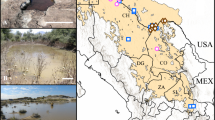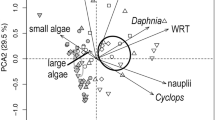Abstract
The ecology of rotifer assemblages in the periphyton has received little attention relative to that of pelagic rotifers. This paper reviews the ecology of periphytic rotifers, with particular emphasis on the role of macrophytes in the structuring of rotifer assemblages spatially and temporally, and compares these aspects with the dynamics of better known pelagic rotifer communities. Littoral rotifer periphyton communities are typically diverse in lakes, and have composition dissimilar to that of the open water. In rivers, diversity and composition in the pelagic and littoral appear to be similar. Rotifers show preference for macrophyte species they associate with, probably through differences in physical structure or complexity, food concentration or composition, chemical factors, macrophyte age, and differences in the degree of protection from predation provided by macrophytes. These mechanisms are in general not well investigated in rotifers. Factors affecting the seasonal dynamics of periphytic communities appear to be similar to pelagic communities, with seasonal dynamics of substrates and disturbance by flooding or drying also being important.
Similar content being viewed by others
References
Andrew, T. E. & A. G. Fitzsimons, 1992. Seasonality, population dynamics and production of planktonic rotifers in Lough Neagh, Northern Ireland.Hydrobiologia 246:147–164.
Berner-Fankhauser, H., 1983.Abundance, dynamics and succession of planktonic rotifers in Lake Biel, Switzerland.Hydrobiologia 104: 349–352.
Blindow, I., 1987. The composition and density of epiphyton on several species of submerged macrophytes - the neutral substrate hypothesis tested.Aquat. Bot.29: 157–168.
Bogdan, K. G. & J. J. Gilbert, 1987. Quantitative comparison of food niches in some freshwater zooplankton.Oecologia72:331–340.
Bonecker, C. C., F. A. Lansac-Tôha & L. M. Bini, 1998. Composition of zooplankton in different environments of theMato Grosso Pantanal, Mato Grosso, Brazil.Anais do VIII seminario regional de ecologia 3: 1123–1135.
Bronmark, C., 1985. Interactions between macrophytes, epiphytes and herbivores: an experimental approach.Oikos45:26–30.
Burkholder, J. M., 1996.Interactions of benthic algae with substrata. In. Stevenson, R. J., M. L. Bothwell & R. L. Lowe (eds), Algal Ecology: Freshwater Benthic Ecosystems. Academic Press. 253–297.
Burkholder, J. M. & R. G. Wetzel,1989. Epiphytic microalgae on a natural substratum in a phosphorus-limited hardwater lake: seasonal dynamics of community structure, biomass and ATP content.Arch. Hydrobiol. Suppl.83: 1–56.
Clément, P., 1977.Phototaxis in rotifers (action spectra).Arch. Hydrobiol. Beih.8:67–70.
De Beauchamp, P. M., 1909.Recherches sur les Rotiferes: les formations tegumentaires et l'appareil digestif.Arch. Zool. Exp. Gen. 4: 1–410.
Donner, J., 1964.Die Rotatorien-Synusien submerser Makrophyten der Donau bei Wien und mehrerer alpenbache.Arch. Hydrobiol. Suppl.27: 227–324.
Donner, J., 1970. Die Rädertierbestande submerser Moose der Salzach und anderer Wasser-Biotope des flussgebietes.Arch. Hydrobiol. Suppl.36:109–254.
Dudley, T. L., 1988. The roles of plant complexity and epiphyton in colonization of macrophytes by stream insects.Verh. Int. Ver. Theor. Agnew. Limnol.23: 1153–1158.
Duggan, I. C., J. D. Green, K. Thompson & R. J. Shiel, 1998. Rotifers in relation to littoral ecotone structure in Lake Rotomanuka, North Island, New Zealand.Hydrobiologia387/388:179–197.
Duggan, I. C., J. D. Green, K. Thompson & R. J. Shiel, submitted. The influence of macrophytes on the spatial distribution of littoral rotifers.Freshwat. Biol.
Dumont, H. J., I. V. De Velde & S. Dumont,1975.The dry weight estimate of biomass in a selection of Cladocera, Copepoda and Rotifera from the plankton, periphyton and benthos of continental waters.Oecologia 19:75–97.
Elliott, J. I., 1977. Seasonal changes in the abundance and distribution of planktonic rotifers in Grasmere (English Lake District). Freshwat. Biol.7: 147–166.
Erben, R., 1987. Rotifer fauna in the periphyton of Karst rivers in Croatia, Yugoslavia. Hydrobiologia147: 103–105.
Eminson, D. F. & B. Moss,1980. The composition and ecology of periphyton communities in freshwaters. I. The influence of host type and external environment on community composition.Br. Phycol. J.15:429–446.
Ferrari, I, A. Farabegoli & R. Mazzoni,1989.Abundance and diversity of planktonic rotifers in the Po River.Hydrobiologia 186/187:201–208.
Fitzgerald, G. P., 1969. Some factors in the competition or antagonism among bacteria, algae and aquatic weeds.J. Phycol.5: 351–359.
Forsberg, C., S. Kleiven & T. Willen, 1990.Absence of allelopathic effects of Chara on phytoplankton in situ.Aquat. Bot.38: 289–294.
Gilbert, J. J. & K. G. Bogdan, 1981. Selectivity of Polyarthra and Keratella for flagellate and aflagellate cells.Verh. int. Ver. Limnol. 21: 1515–1521.
Goddard, K. A. & W. F. McDiffett, 1983.Rotifer distribution, abundance, and community structure in four habitats of a freshwater marsh.J. Freshwat. Ecol.2: 199–211.
Goldsborough, L. G. & M. Hickman,1991.A comparison of periphytic algal biomass and community structure on Scirpus validus and on a morphologically similar artificial substratum. J. Phycol.27:196–206.
Green, J., 1960.Zooplankton of the River Sokoto. The Rotifera. Proc. zool. Soc. Lond.135:491–523.
Green, J., 1972. Freshwater ecology in the Mato Grosso, Central Brazil. III. Associations of Rotifera in meander lakes of the Rio Suiá Miss-u.J. nat. Hist.6:229–241.
Grimshaw, H. J., R. G. Wetzel, M. Brandenburg, K. Segerblom, L. J. Wenkert, G. A. Marsh, W. Charnetzky, J. E. Haky & C. Carraher, 1997. Shading of periphyton communities by wetland emergent macrophytes: decoupling of algal photosynthesis from microbial nutrient retention.Arch. Hydrobiol.139:17–27.
Havens, K. E., 1991.Summer zooplankton dynamics in the limnetic and littoral zones of a humic acid lake.Hydrobiologia 215:21–29.
Herzig, A., 1987.The analysis of planktonic rotifer populations: a plea for long term investigations.Hydrobiologia 147:163–180.
Hewitt, D. P. & D. G. George, 1987. The population dynamics of Keratella cochlearis in a hypereutrophic tarn and the possible impact of predation by young roach. Hydrobiologia 147:221–227.
Hudson, C. T. & P. H. Gosse,1889.The Rotifera or Wheel Animalcules, both British and Foreign.Longmans, Green & Co., London. 2 vols.
Hutchinson, G. E., 1993. A Treatise on Limnology, Volume 4: The Zoobenthos.John Wiley & Sons, New York: 944 pp.
Irvine, K., H. Balls & B. Moss, 1990.The entomostracan and rotifer communities associated with submerged plants in the Norfolk Broadland - effects of plant biomass and species composition. Int. Rev. ges. Hydrobiol.75: 121–141.
Jeffries, M., 1993. Invertebrate colonisation of artificial pondweeds of differeing fractal dimension. Oikos 67: 142–148.
Jersabek, C. D., 1995. Distribution and ecology of rotifer communities in high-altitude alpine sites - a multivariate approach. Hydrobiologia 313/314: 75–89.
Jones, J. I., J. O. Young, G. M. Haynes, B. Moss, J. W. Eaton & K. J. Hardwick, 1999. Do submerged aquatic plants influence their periphyton to enhance the growth and reproduction of invertebrate mutualists? Oecologia 120: 463–474.
Kobayashi, T., R. J. Shiel, P. Gibbs & P. I. Dixon, 1998. Freshwater zooplankton in the Hawkesbury-Nepean River: comparison of community structure with other rivers. Hydrobiologia 377: 133–145.
Kofoid, C. A., 1908. The plankton of the Illinois River, 1889-1899. Part II. Constituent organisms and their seasonal distribution. Bull. Ill. State Lab. Nat. Hist. 8: 1–361.
Koste, W., 1965. Die Rotatorien des Naturdenkmals ‘Engelbergs Moor’ in Druchhorn, Kreis Bersenbrück. Veröff. Naturw. Ver. Osnabrück 31: 49–82.
Koste, W., 1974. Zur Kenntnis der Rotatorienfauna der ‘schwimmenden Wiese’ einer Uferlagune in der Várzea Amazoniens, Brasilien. Amazoniana 5: 25–59.
Langley, J. M., S. Kett, R. S. Al-Khalili & C. J. Humphrey, 1995. The conservation value of English urban ponds in terms of their rotifer fauna. Hydrobiologia 313/314: 259–266.
Lemley, A. D. & J. F. Dimmick, 1982. Structure and dynamics of zooplankton communities in the littoral zone of some North Carolina lakes. Hydrobiologia 88: 299–307.
Meuche, A., 1939. Die fauna im algenbewuchs. Nach untersuchungen im litoral östholsteinischer Seen. Arch. Hydrobiol. 34: 349–520.
Millie, D. L. & R. L. Lowe, 1983. Studies on Lake Erie's littoral algae: host specificity and temporal periodicity of epiphytic diatoms. Hydrobiologia 99: 7–18.
Modenutti, B. E., 1998. Planktonic rotifers of Samborombon River Basin Argentina. Hydrobiologia 387/388:259–265.
Modenutti, B. E. & M. C. Claps, 1988. Monogonota rotifers from plankton and periphyton of pampasic lotic environments Argentina. Limnol. 19: 167–175.
Moore, M. V. & J. J. Gilbert, 1987. Age specific Chaoborus predation on rotifer prey, Freshwat. Biol. 17: 223–236.
Morales-Baquero, R., L. Cruz-Pizarro & P. Carrillo, 1989. Patterns in the composition of the rotifer communities from high mountain lakes and pools in Sierra Nevada Spain. Hydrobiologia 186/187: 215–221.
Onwudinjo, C. C. & A. B. M. Egborge, 1994. Rotifers of Benin River, Nigeria. Hydrobiologia 272: 87–94.
Ostrofsky, M. L. & E. R. Zettler, 1986. Chemical defences in aquatic plants. J. Ecol. 74: 279–287.
Pejler, B., 1962. On the taxonomy and ecology of benthic and periphytic Rotatoria. Investigations in northern Swedish Lapland. Zool. Bidr. Upps. 33: 327–422.
Pejler, B. & B. Berzins, 1989. On choice of substrate and habitat in brachionid rotifers. Hydrobiologia 186/187: 137–144.
Pejler, B. & B. Berzins, 1993a. On relation to substrate in sessile rotifers. Hydrobiologia 259: 121–124.
Pejler, B. & B. Berzins, 1993b. On the ecology of Cephalodella. Hydrobiologia 259: 125–128.
Pejler, B. & B. Berzins, 1993c. On the ecology of Colurellidae (Rotifera). Hydrobiologia 263: 61–64.
Pejler, B. & B. Berzins, 1993d. On the ecology of Dicranophoridae (Rotifera). Hydrobiologia 259: 129–131.
Pejler, B. & B. Berzins, 1993e. On the ecology of Trichocercidae (Rotifera). Hydrobiologia 263: 55–59.
Pejler, B. & B. Berzins, 1994. On the ecology of Lecane (Rotifera). Hydrobiologia 273: 77–80.
Pejler, B. & B. Berzins, 1995. Relation to habitat in rotifers. Hydrobiologia 313/314: 267–278.
Pennak, R. W., 1962. Quantitative zooplankton sampling in littoral areas. Limnol. Oceanogr. 7: 487–489.
Pennak, R. W., 1966. Structure of zooplankton populations in the littoral macrophyte zone of some Colorado lakes. Trans. am. Microsc. Soc. 85: 329–349.
Pontin, R. M. & R. J. Shiel, 1995. Periphytic rotifer communities of an Australian seasonal floodplain pool. Hydrobiologia 313/314: 63–67.
Pourriot, R., 1977. Food and feeding habits of Rotifera. Arch. Hydrobiol. Beih. 8: 243–260.
Preissler, K., 1977a. Do rotifers show ‘Avoidance of the shore’? Oecologia 27: 253–260.
Preissler, K., 1977b. Horizontal distribution and ‘avoidance of shore’ by rotifers. Arch. Hydrobiol. Beih. 8: 43–46.
Preissler, K., 1980. Field experiments on the optical orientation of pelagic rotifers. Hydrobiologia 73: 199–203.
Rodgers, K. H. & C. M. Breen, 1983. An investigation of macrophyte, epiphyte and grazer interactions. In Wetzel, R. G. (ed.), Periphyton of Freshwater Ecosystems. Dr W. Junk Publishers, The Hague: 217–226.
Roos, P. J., 1983. Dynamics of periphytic communities. In Wetzel, R. G. (ed.), Periphyton of Freshwater Ecosystems. Developments in Hydrobiology 17: 5–10.
Ruttner-Kolisko, A., 1974. Planktonic rotifers: biology and taxonomy. Die Binnengewasser Supplement. 26: 1–146.
Sanoamuang, L., 1992. The ecology of mountain lake rotifers in Canterbury, with particular reference to Lake Grasmere and the genus Filinia Bory de St. Vincent. Unpublished PhD thesis, The University of Canterbury, Christchurch, New Zealand.
Saunders-Davies, A. P., 1989. Horizontal distribution of plankton rotifers Keratella cochlearis (Bory de St. Vincent) and Polyarthra vulgaris (Carlin) in a small eutrophic lake. Hydrobiologia 186/187: 153–156.
Sollberger, P. J. & L. J. Paulson, 1992. Littoral and limnetic zooplankton communities in Lake Mead, Nevada-Arizona, U.S.A. Hydrobiologia 237: 175–184.
Vasconcelos, V., 1990. Seasonal fluctuation in the zooplankton community of Albizo reservoir (Portugal). Hydrobiologia 196: 183–191.
Wallace, R. L., 1977a. Adaptive advantages of substrate selection by sessile rotifers. Arch. Hydrobiol. Beih. 8: 53–55.
Wallace, R. L., 1977b. Distribution of sessile rotifers in an acid bog pond. Arch. Hydrobiol. 79: 478–505.
Wallace, R. L., 1980. Ecology of sessile rotifers. Hydrobiologia 73: 181–193.
Wallace, R. L. & W. T. Edmondson, 1986. Mechanism and adaptive significance of substrate selection by a sessile rotifer. Ecology 67: 314–323.
Walsh, E. J., 1989. Oviposition behavior of the littoral rotifer Euchlanis dilatata. Hydrobiologia 186/187: 157–161.
Walsh, E. J., 1995. Habitat-specific predation susceptibilities of a littoral rotifer to two invertebrate predators. Hydrobiologia 313/314: 205–211.
Wetzel, R. G., 1983. Opening Remarks. In Wetzel, R. G. (ed.), Periphyton of Freshwater Ecosystems. Dr W. Junk Publishers, The Hague: 3–4.
Wium-Anderson, S., U. Anthoni, C. Christophersen & G. Hoen, 1982. Allelopathic effects on phytoplankton by substances isolated from aquatic macrophytes (Charales). Oikos 39: 187–190.
Author information
Authors and Affiliations
Rights and permissions
About this article
Cite this article
Duggan, I.C. The ecology of periphytic rotifers. Hydrobiologia 446, 139–148 (2001). https://doi.org/10.1023/A:1017599206332
Issue Date:
DOI: https://doi.org/10.1023/A:1017599206332




